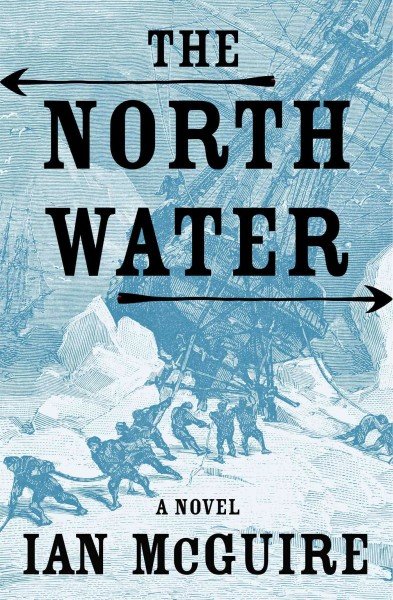So last week I had the gripping-if-ghastly reading experience of zooming through Ian McGuire’s new novel, The North Water. I’ll try to be circumspect in my comments here so as not to spoil the reading “fun” for others, as I do heartily recommend it. Simply put, I’d rank it as one of the best new novels I’ve read in the last few years. It’s a literary adventure tale of sorts, not for the faint of heart. At times I’m sure the gore would be over the top, or too much, for some readers, but eventually I think the power and eccentricity of the language is more important than the blood, pus, and other bodily fluids that leak or gush about on one page or another. You could certainly label it “Tarantinoesque,” but it’s smarter than Tarantino’s films, and the gore has more seriousness to it—more shocking than, say, humorous, as some of the scenes in Django Unchained (2012) are downright funny, not particularly thoughtful.

The obvious comparison is Herman Melville’s Moby Dick (1851). The story unfolds in 1857-59, and the point is made repeatedly that it’s the end of the whaling era, which figures into the plot dynamics. There’s a good vs. evil dynamic with the characters of Patrick Sumner vs. Henry Drax, although Drax is not the maniacal captain a la Moby Dick’s Ahab, and Sumner is ultimately both more fallen and resourceful than Ishmael. The North Water is less philosophical, shorter, and tighter than Moby Dick, and obviously is a child of the 21st century, as Melville’s masterpiece is a child of the 19th century. Even though Queequeg and Ishmael sleep together at their first meeting, and become bosom buddies, Melville is hesitant to write about homosexuality, which plays a bit part in the plot of The North Water. Both novels have a “mythic” feel to them, and as far as what’s realistic or not, I’d give Melville more credit there, for having actually been a sailor on a whaling ship in that era. To me that doesn’t matter. The North Water isn’t necessarily trying to be realistic, and the one work of literature that figures prominently in the background of the story is The Iliad, and that touchstone of myth is telling.
Other comparisons are to Cormac McCarthy’s Blood Meridian (1985) and the recent Leo DiCaprio film, The Revenant (2015). The Sumner/Drax dynamic corresponds to the Hugh Glass/Fitzgerald of The Revenant, with Drax being the implacable force of blunt trauma, and Sumner being the more reflective and wronged party in this death dance. What sets The North Water apart is its archaic, elaborate language, which includes some knife-edge descriptions of the frozen Arctic seas. In that respect it more closely resembles McCarthy’s Blood Meridian, which is famous for its Satanic character Judge Holden, but which also owes much of its power to its baroque language and the fantastic descriptions of the desert wild lands of Mexico and the Southwest.
- October 2023
- September 2023
- September 2021
- April 2020
- September 2019
- May 2019
- August 2018
- February 2018
- January 2018
- October 2017
- August 2017
- June 2017
- May 2017
- March 2017
- February 2017
- November 2016
- October 2016
- May 2016
- April 2016
- March 2016
- February 2016
- January 2016
- November 2015
- October 2015
- September 2015
- June 2015
- May 2015
- April 2015
- March 2015
- December 2014
- September 2014
- August 2014
- May 2014
- March 2014
- February 2014
- January 2014
- December 2013
- November 2013
- October 2013
- September 2013
- August 2013
- July 2013
- June 2013
- May 2013
- April 2013
- March 2013
- February 2013
- January 2013
- December 2012
- November 2012
- October 2012
- September 2012
- August 2012
- July 2012
- June 2012
- May 2012
- April 2012
- March 2012
- February 2012
- January 2012
- December 2011
- November 2011
- October 2011
- September 2011
- August 2011
- July 2011
- June 2011
- May 2011
- April 2011
- March 2011
- February 2011
- January 2011
- December 2010
- November 2010
- October 2010
- September 2010
- August 2010
- July 2010
- June 2010
- May 2010
- April 2010
- March 2010
- February 2010
- January 2010
- December 2009
- November 2009
- October 2009
- September 2009
- August 2009
- July 2009
- June 2009
- May 2009
- April 2009
- March 2009
Recent Posts
- Aliens Among Us: Probing Hillbillies and Freaking Shut-ins, How Netflix’s “Encounters” and Hulu’s “No One Will Save You” Prep Us for the Coming Alien Apocalypse, Kind of
- My Life as a Bob Odenkirk Character: On How Watching Netflix’s Black Mirror episode “Joan Is Awful” Mimicked My Experience of Watching the AMC series Lucky Hank
- “Bobcats, Bobcats, Bobcats”: Animal Life and a Tribute to “Modern Family”
- “The North Water”: This Ain’t Your Daddy’s Moby Dick
- Day 25: On David Quammen's "Spillover": Terrific Book That Foretold Our Pandemic, Kind of
Recent Comments
No comments to show.
